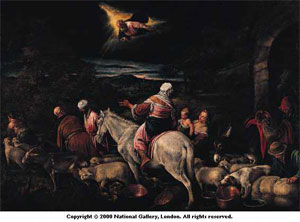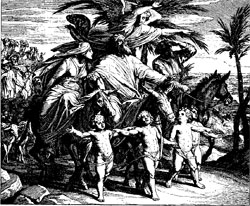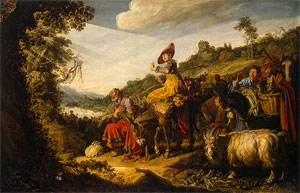Leave Your Country
For Sunday February 20, 2005
Second Sunday in Lent
Lectionary Readings (Revised Common Lectionary, Year A)
Genesis 12:1–4
Psalm 121
Romans 4:1–5, 13–17
John 3:1–17
 |
The Departure of Abraham late 16th century, Jacopo Bassano |
About 4,000 years ago a family of semitic nomads left Ur of the Chaldeans, perhaps in southeastern Iraq near Nasariyah, and settled in Haran, Turkey, on the Syrian border. There in Haran the father Terah died, and the son Abraham received a divine command to continue his journey: "Leave your country, your people, and your father's household and go to the land I will show you" (Genesis 12:1). Believing that he had heard the very voice of God, at the age of seventy-five "Abram left, as the Lord had told him" (Genesis 12:4), and journeyed toward the land of Canaan.
Abraham left Haran in faith, not knowing where he was going, or even why except that God had commanded him. He acted whole-heartedly without absolute certainty.1 In so doing he defied both the inner propensities of human nature and the outer pressures of cultural conformity to cling to the familiar, the self-serving, and the broad and easy road. Abraham journeyed from what he knew to what he did not know, from what he had to what he did not have, from the the comfortable to the strange and the unpredictable. He journeyed "like a stranger in a foreign country" (Hebrews 11:8–9). Today, most everything in our culture, education and employment encourages us to journey in the opposite direction: from the unknown to the known, from what we do not have to what we think we want and need, making every effort to remove the strange and unpredictable in order to guarantee the safe and the secure. We demand certainty and act timidly.
 |
The Call of Abraham by Julius Schnoor (19th century) |
Last week I returned from a ten-day trip to Ethiopia with a group from my Presbyterian church. Having left my country, everything familar gave way to all things strange—the sights, sounds, smells, food, language, customs, music, geography, climate, even the slightest hand gesture. The leafy neighborhoods of Palo Alto gave way to Addis Ababa's endless squatter "houses" made of corrugated tin and plastic. The polluted air in that city of about 4 million people forced me to remove and clean my contact lens several times a day. Bottled water, rather than the tap, was the order of the day. All the political peace and economic affluence we enjoy in North America paled when we remembered how the brutal Marxist regime of Haile Mariam Mengistu (1977-1991) aggravated the droughts of the 1980s to transform famine into a weapon of war2. Indeed, as the mayor of Addis Ababa told a delegation from our church, the city was "in deep shit." If you are shocked by that language, imagine how our team felt; but it is nonetheless true, and you might imagine how the Ethiopians feel.
God's command to Abraham to leave his country included a promised blessing. In some strange way his outer, geographic journey from Haran to Canaan would elicit God's divine favor:
I will make you into a great nation
and I will bless you;
I will make your name great,
and you will be a blessing.
I will bless those who bless you,
and whoever curses you I will curse;
And all peoples on earth
will be blessed through you. (Genesis 12:2-3)
Jews, of course, identify Abraham as their founding father, Christians trace the lineage of Jesus Christ back to him (Matthew 1:1), and Muslims revere him as a friend of God, a father of the prophets, and an ancestor of Mohammed (Koran 37:109). In his singular journey, then, Abraham instigated blessings to the entire world.
Abraham learned that the Spirit of God was at work on the road to Canaan as well as back home in Ur or Haran. God met and blessed him where he was headed and not only where he had been. In Addis Ababa I was reminded that the Spirit of God is as mightily present in Ethiopia as well as in Palo Alto, maybe more so. In Lalibella we visited churches in the remote desert that had been hewn from solid rock some 800 years ago and used for worship ever since. At the Sisters of Mercy home for the destitute and dying we were awed at the poignant strength and grace of Sister Ignacia from Slovakia as she ministered to screaming kids, teenage mothers with newborn babies, the severely retarded, and adults dying of AIDS. At their orphanage, 400 HIV-positive children experienced the love of God. Physicians Tim and Carolyn conducted community health seminars for HIV prevention. But I never would have experienced these divine blessings if I had not made the outer, geographic journey from Palo Alto, if I had not left the tried and the true, the known, the familiar and the comfortable.
 |
Abraham on the road to Canaan Pieter Lastman, 1614 |
The longest and hardest journey, though, is not the journey without but the journey within. Barely ten verses after God's command to leave his country and promise to bless Abraham, the Genesis narrative depicts him as lying about his wife and quarreling with his nephew Lot. Abraham's geographic journey thus becomes a metaphor for our spiritual journeys. However daunting and strange, the geography of ancient Canaan or contemporary Palo Alto pales in comparison to the importance and complexity of the geography of the human heart. In my own experience I find it far easier to leave Palo Alto for Addis Ababa than to leave greed and journey for contentment, to travel from fear, anxiety, envy, regret, apathy, and bitterness, and arrive at destinations such as safety, peace, gratitude, service, and forgiveness.
Lent, then, is not merely about giving up chocolate, meat, or alcohol. Those are only external reminders of an internal transformation that we seek. Our ultimate journey is to move from a self-regarding heart curved in on itself to an other-regarding openness to the love of God, a love for others, and a love for all His world. That, of course, is a journey that lasts a lifetime.
The twin journeys of our outer choices and our inner hearts are closely intertwined. Each one shapes the other. The outer choices we make, for example, about our time, our money, our jobs, and so on shape in some mysterious way the person we are becoming, so that in a sense we form ourselves by a life time of accumulated decisions. Reciprocally, as we grow in the inner depths of our hearts, we learn to make choices that are wise and good for both us and for others.
The truly good news of Jesus, writes pastor Craig Barnes, is that "all of the roads belong to God," and that "the Savior can use any road to bring us home." Quoting CS Lewis, he reminds us that the God who called Abraham can even use the wrong roads on our life journey to take us to the right places.3
[1] Warren Goldstein, William Sloane Coffin Jr.; A Holy Impatience (New Haven: Yale University Press, 2004, p. 185).
[2] See Robert Kaplan, Surrender or Starve; Travels in Ethiopia, Sudan, Somalia, and Eritrea (New York: Vintage, 1988, 2003).
[3] M. Craig Barnes, Searching for Home; Spirituality for Restless Souls (Grand Rapids: Brazos Press, 2003), pp. 121, 128.





